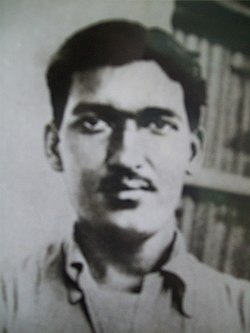Ashfaqulla Khan
Ashfaqulla Khan | |
|---|---|
 | |
| Born | 22 October 1900 |
| Died | 19 December 1927 (aged 27) |
| Organization | Hindustan Republican Association |
| Known for | Mastermind behind Kakori train robbery |
| Website | www |
Ashfaqulla Khan (22 October 1900 – 19 December 1927) was an Indian independence activist in the Indian independence movement and co-founder of the Hindustan Socialist Republican Association.[1][2]
Early life[edit]
Khan was born in Shahjahanpur, India to Shafiq Ullah Khan and Mazharunissa. He was born in a Muslim Pathan family[3][4] of Khyber tribe.[5][6] He was the youngest among his five siblings.[7]
In 1920, Mahatma Gandhi launched his Non-cooperation movement against British rule in India. After the Chauri Chaura incident in 1922, Gandhi decided to withdraw the call for this movement.[8]
At that point, many young people, including Khan, felt depressed. That is when Khan decided to form an organization with like-minded freedom fighters which resulted in the formation of Hindustan Republican Association in 1924. This association's purpose was to organize armed revolutions to achieve a free India.
Kakori Robbery[edit]
To give a boost to their movement and buy arms and ammunition to carry out their activities, the revolutionaries of the Hindustan Socialist Republican Association organised a meeting on 8 August 1925 in Shahjahanpur. After much deliberation, it was decided to loot the government treasury carried in the trains. On 9 August 1925, Khan and other revolutionaries, namely Ram Prasad Bismil, Rajendra Lahiri, Thakur Roshan Singh, Sachindra Bakshi, Chandrashekar Azad, Keshab Chakravarty, Banwari Lal, Murari Lal Gupta, Mukundi Lal, and Manmathnath Gupta attacked and robbed a government train in Kakori near Lucknow.[7][9][10]
A month passed after the train action, and yet none of the train robbers were arrested, even though the British government had spread a large investigative net.[7] On the morning of 26 October 1925, Ram Prasad Bismil was caught by the police. Khan was, however, the only one of the group untraced by the police. He went into hiding and moved to Banaras from Bihar, where he worked in an engineering company for ten months.
He wanted to move abroad to learn engineering to further help the freedom struggle and so he went to Delhi to find ways to move out of the country. He took the help of one of his Pathan friends who was also his classmate in the past. This friend, in turn, betrayed him by informing the police about his whereabouts[8][7] and on the morning of 7 December 1926 police came to his house and arrested him.
Khan was detained in the Faizabad jail and a case was filed against him. His brother Riyasat Ullah Khan was his legal counsel. While in jail, Khan recited the Quran and started saying his prayers regularly and strictly fasted during the Islamic month of Ramadan. The case for the Kakori dacoity was concluded by imposing the death sentence on Bismil, Khan, Rajendra Lahiri and Thakur Roshan Singh. The others were given life sentences.[7][11][12]
Death and legacy[edit]
Khan was put to death by hanging on 19 December 1927 at Faizabad Jail.[8] He is considered a martyr for the cause of Indian independence.[7][13]
Portrayals[edit]
The actions of Khan and his compatriots have been depicted in the Hindi film Rang De Basanti (2006), where his character is depicted by Kunal Kapoor. Chetanya Adib portrayed Khan in the Star Bharat television series Chandrashekhar. Mujahid-E-Azadi – Ashfaqullah Khan, an Indian television series airing on DD Urdu in 2014, starring Gaurav Nanda in the titular role.[14]
See also[edit]
Citations[edit]
- ↑ S. Waris 2003, p. 8-14.
- ↑ RAO, N. P. SHANKARANARAYANA (January 2014). Ashfaqulla Khan. Litent.
- ↑ "Ashfaqullah Khan – निर्भय क्रांतिकारी अशफ़ाक उल्ला खान". Jagran blog. Retrieved 12 September 2020.
- ↑ "Ashfaq Ullah Khan". Aaj Tak. 22 October 2018.
- ↑ Joseph, Raveena (3 September 2015). "The martyr monologue". The Hindu. ISSN 0971-751X. Retrieved 12 September 2020.
- ↑ Waris, Prof. Farukh S. (31 March 2015). UNSUNG HEROES Volume-II. Indus Sourcebooks. p. 8. ISBN 978-81-88569-33-5.
- ↑ 7.0 7.1 7.2 7.3 7.4 7.5 Shankaranarayana Rao, N.P. "Ashfaqulla Khan: The Immortal Revolutionary". Press Information Bureau, Government of India. Archived from the original on 5 November 2002. Retrieved 27 August 2019.
- ↑ 8.0 8.1 8.2 Singh, Aparna (2 August 2004). "Daredevilry of sons of the soil". The Times of India (newspaper). Retrieved 7 January 2018.
- ↑ "Explained: Who was Ashfaqullah Khan, and why did the British hang him?". 10 January 2020.
- ↑ "Kakori Conspiracy: Why were Ram Prasad Bismil, Ashfaqulla Khan and Roshan Singh hanged?". India Today. 19 December 2017.
- ↑ S. Ravi (22 March 2018). "Wielding the pen and pistol". The Hindu. Retrieved 27 August 2019.
- ↑ "Kakori Martyrs Were Symbols of Communal Harmony in India's Freedom Struggle". The Wire.
- ↑ "Tributes paid to martyr Ashfaqulla Khan". The Tribune (India newspaper), 22 October 2015. Retrieved 27 August 2019.
- ↑ "DD Urdu Program Schedule" (PDF). doordarshan.gov.in. 27 July 2019.
General bibliography[edit]
- S. Waris, Prof. Farukh (31 March 2015). UNSUNG HEROES Volume-II (PDF). Indus Soucebooks. pp. 8–14. ISBN 978-81-88569-33-5.
- 1900 births
- 1927 deaths
- Revolutionary movement for Indian independence
- Executed revolutionaries
- Indian revolutionaries
- People executed by British India by hanging
- People from Shahjahanpur
- Indian Muslims
- Executed Indian people
- 20th-century executions by British India
- Hindustan Socialist Republican Association
- Indian nationalists
- Indian independence armed struggle activists